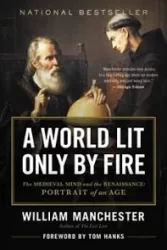A World Lit Only by Fire – Part III
A peasant’s son Martin Luther never knew the year he was born. Believing children were wicked his father whipped him, his mother caned him. Luther’s harsh life led him to take refuge in the cloister.
The Saxon prince started a college – Luther moved to Wittenburg, taught about St. Paul. Believed, like Paul, truth and God were one thing, not two separate things. Staring at the rot in the medieval church shook his head. He wasn’t alone. An ambassador wrote the Holy Roman emperor ‘people here hate priests.’
Luther nailed a proclamation on the door of Wittenburg church denouncing indulgences – a dam broke. Anger spread. The sale of indulgences plummeted. The Archbishop of Mainz told the pope: Outlaw Luther.
The pope ordered Luther to come to Rome.
He said no.
Leo sent a cardinal to Augsburg – facing Luther the cardinal demanded: Recant.
Luther shook his head, rode to a debate in Leipzig, walked into a trap. Narrow-faced, out to nail Luther, Johann Eck said two words: Jan Hus.
Hus had denounced a pope selling indulgences in Bohemia before Luther was born; stripped of his clothes, hands tied, a chain around his neck, Hus was burned at the stake.
Pointing at Luther, Eck growled: Was Hus a heretic?
Luther said no.
Eck handed Leo what he needed to burn Luther at the stake – an unseen hand moved: The Holy Roman Emperor died. Seven German princes – electors – met in Frankfurt to pick the next emperor.
Two kings – one from France, the other Spain – wanted to be emperor. Leo, seeing both as threats to his power, didn’t want either; manipulating, needing the prince of Saxony’s vote, Leo ignored Luther’s heresy.
Spending 850,000 ducats, bribing electors, the King of Spain became emperor. No longer needing the Saxon prince Leo excommunicated Luther – an unseen hand moved again: A war started. Seeking the pope’s help to defeat the King of France, the King of Spain, the new Holy Roman Emperor, called Luther to an Imperial Diet in the ancient city of Worms to stand trial.
Wearing his monk’s robe, facing an inquisitor in Worms, Luther stared at a table piled with his books – the inquisitor demanded Luther recant every heresy he’d written.
Surrounded by nobles in flowered vestments, silken shirts, furred jackets, hesitating Luther faltered, asked for more time – the emperor gave him one day. The next morning Luther walked back into the courtroom, said every word he’d written about the church was true.
The emperor roared: No!
The inquisitor snapped: Do you repudiate your heresy?
Every word until that moment had been spoken in Latin – Luther answered in German:
‘Here I stand. I can do no other.’
It was, Thomas Carlyle wrote later, ‘the greatest moment in the modern history of man.’
*****
To be continued – Part IV: The Reformation


A World Lit Only by Fire – Part III


A peasant’s son Martin Luther never knew the year he was born. Believing children were wicked his father whipped him, his mother caned him. Luther’s harsh life led him to take refuge in the cloister.
The Saxon prince started a college – Luther moved to Wittenburg, taught about St. Paul. Believed, like Paul, truth and God were one thing, not two separate things. Staring at the rot in the medieval church shook his head. He wasn’t alone. An ambassador wrote the Holy Roman emperor ‘people here hate priests.’
Luther nailed a proclamation on the door of Wittenburg church denouncing indulgences – a dam broke. Anger spread. The sale of indulgences plummeted. The Archbishop of Mainz told the pope: Outlaw Luther.
The pope ordered Luther to come to Rome.
He said no.
Leo sent a cardinal to Augsburg – facing Luther the cardinal demanded: Recant.
Luther shook his head, rode to a debate in Leipzig, walked into a trap. Narrow-faced, out to nail Luther, Johann Eck said two words: Jan Hus.
Hus had denounced a pope selling indulgences in Bohemia before Luther was born; stripped of his clothes, hands tied, a chain around his neck, Hus was burned at the stake.
Pointing at Luther, Eck growled: Was Hus a heretic?
Luther said no.
Eck handed Leo what he needed to burn Luther at the stake – an unseen hand moved: The Holy Roman Emperor died. Seven German princes – electors – met in Frankfurt to pick the next emperor.
Two kings – one from France, the other Spain – wanted to be emperor. Leo, seeing both as threats to his power, didn’t want either; manipulating, needing the prince of Saxony’s vote, Leo ignored Luther’s heresy.
Spending 850,000 ducats, bribing electors, the King of Spain became emperor. No longer needing the Saxon prince Leo excommunicated Luther – an unseen hand moved again: A war started. Seeking the pope’s help to defeat the King of France, the King of Spain, the new Holy Roman Emperor, called Luther to an Imperial Diet in the ancient city of Worms to stand trial.
Wearing his monk’s robe, facing an inquisitor in Worms, Luther stared at a table piled with his books – the inquisitor demanded Luther recant every heresy he’d written.
Surrounded by nobles in flowered vestments, silken shirts, furred jackets, hesitating Luther faltered, asked for more time – the emperor gave him one day. The next morning Luther walked back into the courtroom, said every word he’d written about the church was true.
The emperor roared: No!
The inquisitor snapped: Do you repudiate your heresy?
Every word until that moment had been spoken in Latin – Luther answered in German:
‘Here I stand. I can do no other.’
It was, Thomas Carlyle wrote later, ‘the greatest moment in the modern history of man.’
*****
To be continued – Part IV: The Reformation